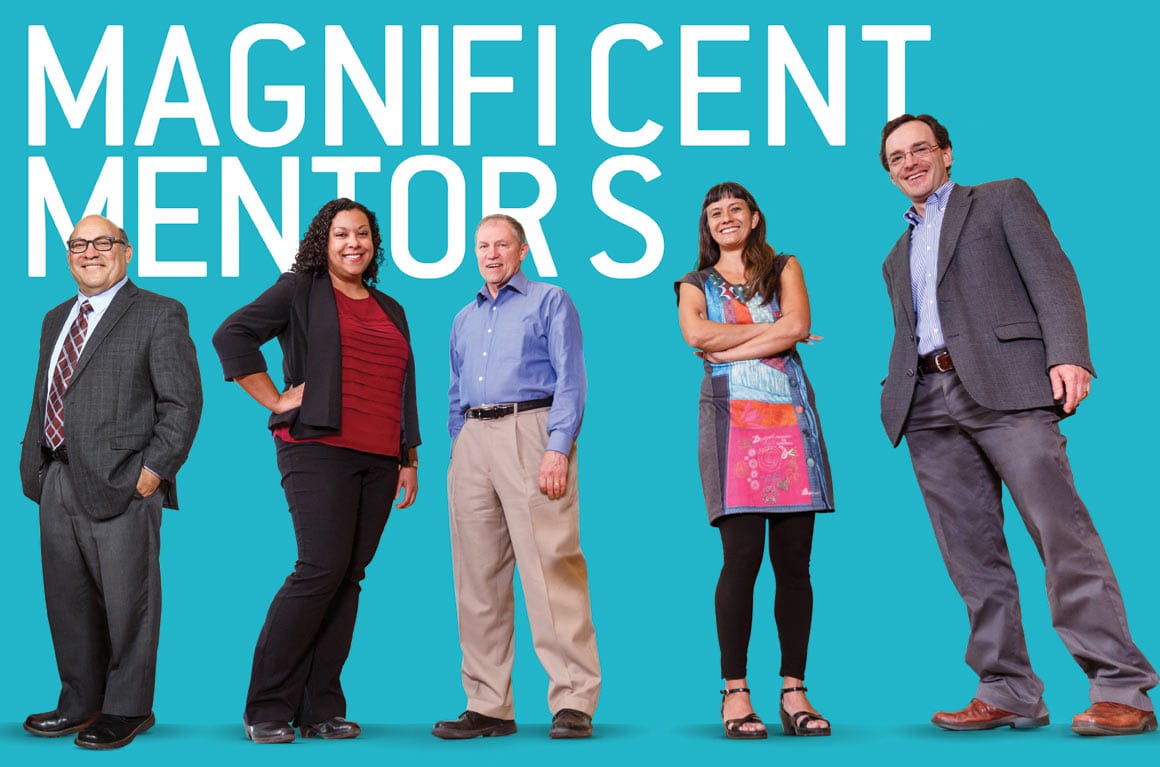
Five alums who give their time, insight, and expertise to help students navigate law school—and beyond
By Andrew Cohen
In The Odyssey, Homer’s epic tale, King Odysseus places the care of his home and beloved son in the hands of a friend—Mentor—before heading off to fight in the Trojan War. Three thousand years later, the responsibilities of modern-day mentors might be far less daunting, but the role of trusted advisor endures.
Every Top 10 law school boasts talented faculty, exceptional students, and top-notch programs. The spirit of a school—its collegiality, camaraderie, and the continuity of connection with alumni—is often what makes it distinctive.
That’s where mentorship can make a difference. And at Berkeley Law, students happily find that more alums than ever devote their most precious commodity—time—to mentoring. By supervising clinic projects, facilitating professional networks, and offering job interview tips, this busy lot is generously helping the next generation traverse law school and beyond.
Meet five Berkeley Law grads whose mentoring helps enrich student lives—and their own.
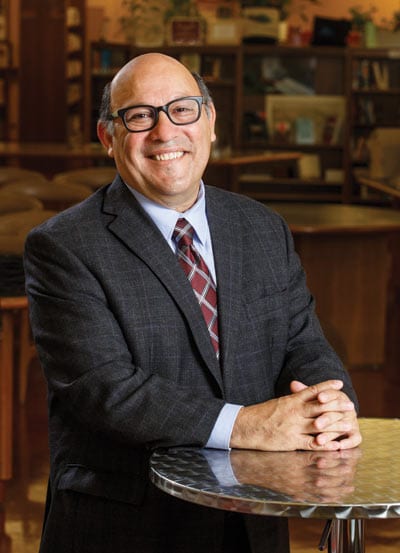
WALKING THE WALK: Marin County public defender Jose Varela has developed several mentoring-related programs during his 30-year career.
JOSE VARELA ’86
THE WHOLE TRUTH, AND NOTHING BUT
Mentoring is not an altruistic hobby for Jose Varela ’86. It’s a way of life. Whether serving as a case consultant, career advisor, or father figure, he tries to be a supportive professional and, at the same time, a teacher who expects solid legal competence.
“The nuances of lawyering aren’t taught in law schools,” he says. “Negotiating a salary, dealing with criticism, staying disciplined during a heated trial—it’s a long list. I love helping people navigate those areas.”
Despite a hectic schedule as Marin County’s public defender, Varela spends significant time guiding students from Berkeley Law, other law schools, colleges, and even high schools. Having developed several mentoring-related programs in his career, he offers candid and frequently unsweetened advice.
“Some mentors often focus on being cheerleaders,” he says. “But if we don’t give young people realistic assessments—of themselves and of the profession—we do them a disservice.”
Recently, Varela met with a law student who had interned at a district attorney’s office. “He was bemoaning how his supervisor got on his case,” Varela recalls. “But after we talked through what happened, it became clear that his supervisor was just giving pointed and realistic constructive criticism.”
Varela mentors Berkeley Law students who work in his office, meet him through the Association of Latino Marin Attorneys, or contact him directly. He also speaks regularly at the school on how students can best cultivate productive mentoring relationships with attorneys.
“For law students and young lawyers, it’s a big plus to have parents who were also lawyers or who come from professional networks,” he says. “That opens a lot of doors. But if you’re the first in your family to attend college or otherwise don’t have those networks, you’re at a disadvantage. It’s wonderful to help level that playing field.”
Early in his legal career, an experienced co-worker at the Los Angeles Public Defender’s Office told him, “Sometimes you have to be twice as good to get half as far.” Varela began accepting more challenging cases, offering himself for more community volunteer work, and mentoring others. Now, nearly three decades later, he says mentoring “is critical to providing hope and support in an often cynical profession.”
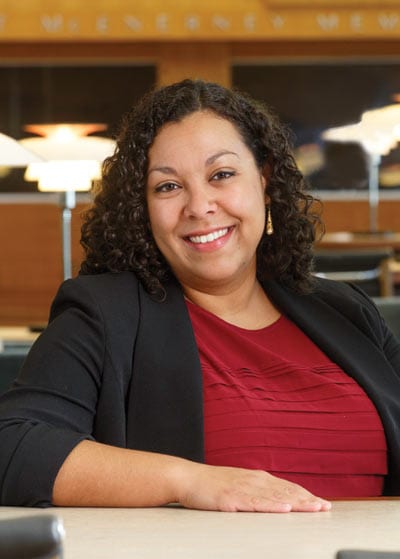
CARA SANDBERG ’12
ALL-PURPOSE PROVIDER
In baseball parlance, Cara Sandberg ’12 is a prized utility player. While Berkeley Law appreciates alums who can counsel people in specific areas, it also relishes grads like Sandberg, whose mentoring versatility helps a diverse lineup of students score confidence, interviews, and jobs.
Soon after graduating, she became a go-to mentor for women of color, African-American students, and judicial clerkship applicants. Providing guidance and reassurance is a natural fit for Sandberg, who served as the dean of a Bronx high school before enrolling at Berkeley Law.
“I remember how utterly confused I felt during my first year of law school,” she admits. “Without the guidance of some wonderful and motivated people at the Women of Color Collective, I would have been totally lost. When I reached the point where I had some knowledge that could help other students, it was exciting to return the favor.”
As a student, Sandberg did that within formal mentoring programs through the Collective and the California Law Review. Now an impact litigation fellow at the Santa Clara County Counsel’s office, she often confers with Berkeley Law students.
“It’s a great way to hear about what’s going on at the school and to stay connected,” Sandberg says. “I enjoy seeing how available our alumni are to current students. Any time I reach out to classmates or colleagues about talking with a student or a recent grad, they’re always willing to give their time.
“With students, I often explicitly say, ‘I’m happy to help you because I know you’ll help the students coming behind you.’ It’s heartening to see that happen repeatedly. Students I’ve worked with go above and beyond for others. That reflects what makes Berkeley special—its culture of collaboration rather than competition.”
Sandberg also applauds the school’s First Generation Professionals group for elevating that culture. Formed in 2011, the student organization now provides mentorship, career advising, networking events, and social activities for more than 50 first-generation students.
“Many of the students I’ve worked with include First Generation Professionals on their resume,” she says. “That’s great to see. Members provide valuable support and guidance to one another, and their presence enriches the law school in numerous ways.”
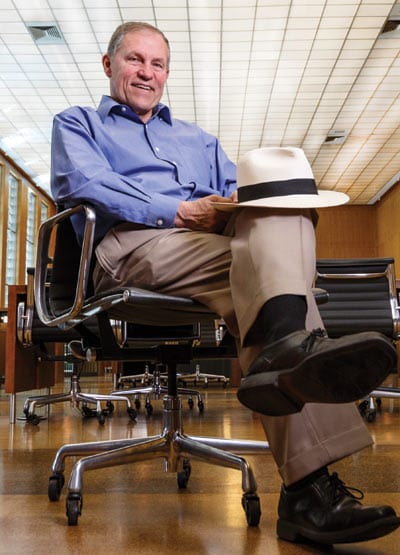
DAVID ROBERTS ’74
TAKING CARE OF BUSINESS
For years, David Roberts ’74 has seen young lawyers struggle to grasp vital business concepts. “Many don’t understand how business really works,” says Roberts, who has founded several INC 500 companies and is now a managing director of Focus Investment Banking. “Firms and their clients don’t want to spend time and money educating new lawyers about how to advise on transactions.”
So when lecturer Bill Kell launched Berkeley Law’s New Business Practicum in 2007, he reached out to Roberts and other experts who could help students bridge that gulf. The Practicum teams business students with law students to tackle core issues that new entities often encounter.
It also lets Roberts take to the stage.
“I play the role of a business person who has a problem and needs advice,” he says of the Practicum’s training simulations. “We present various client personas, from arrogant to chauvinistic to innocent to someone going through a divorce. Business lawyers have to deal with more than just contract terms; they have to deal effectively with the human aspect of transactions. In these simulations, we cover practical and ethical issues, and address business areas that many lawyers fail to anticipate.”
The scenarios are all grounded in real-life cases—many of which Roberts has confronted personally. A former securities analyst and portfolio manager with a hedge fund that focused on health care investments, he now leads a six-person mergers and acquisitions team for his company’s automotive group.
Amid the growing demand for lawyers who can ably address business clients’ concerns, Roberts derives “tremendous satisfaction” from helping Berkeley Law students through the Practicum and individually. When talking with them, he relays personal triumphs—as well as stumbles.
“I’ve started a number of companies as an entrepreneur, from a Chuck E. Cheese franchise to a billion-dollar collision repair company; some were successful and some weren’t so successful,” says Roberts, who earned a JD from Berkeley Law and an MBA from Haas School of Business. “I’ve had the executive who embezzled, the employee who was sued for sexual harassment, and the investor who got cold feet.
It’s gratifying to relay these experiences and help students gain a broader appreciation of how to approach and solve key issues, and how to learn what they mean in a larger context.”
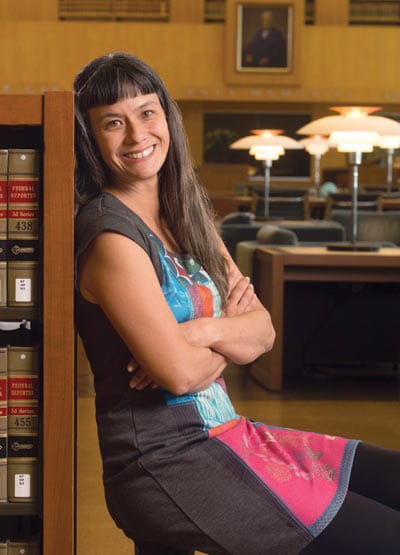
MIYOKO SAKASHITA ’05
FINDING THE RIGHT ENVIRONMENT
During her student days at Berkeley Law, a mentoring program connected Miyoko Sakashita ’05 with alums working in environmental law. “I got to know another woman who was enjoying success on a path I wanted to pursue, which was huge for me,” she says. “She assuaged many of my concerns and really built my confidence.”
Sakashita also demonstrated what mentors universally encourage in their mentees—initiative. She researched organizations that sparked her interest, volunteered for the Center for Biological Diversity, and was offered a full-time position. Now the Center’s oceans director and senior counsel, she helps secure protections for imperiled marine life and ecosystems from threats such as global warming, ocean acidification, and pollution.
“The Center’s staff members were so inspiring,” she says. “They were very effective in saving wild places and getting other meaningful conservation results. Beyond that, they made it a point to spend time talking with me about how to maximize my efforts in this type of work. I kept in contact, followed the cases they were working on—and eventually begged them for a job.”
Sakashita now works closely with the Center’s law clerks, including a “steady pipeline” of Berkeley Law students. When mentoring aspiring lawyers, she focuses on three main areas: learning their professional goals, giving them the workplace tools to gain full-time environmental law positions, and—much like Varela—providing “real feedback that isn’t sugarcoated.”
She also facilitates networking connections by introducing clerks to established professionals in the field at conferences and social gatherings.
In addition, Sakashita sits on the advisory board for Berkeley Law’s Center for Law, Energy & the Environment, a role she has held since 2007. She is “thrilled” to see the school’s new Environmental Law Clinic and longstanding Environmental Law Certificate expand career-enhancing opportunities—and to provide a sounding board for students pursuing them.
“In our line of work, we’re building a movement that needs driven and talented new lawyers,” Sakashita says. “If we truly value saving the planet, we need creative people who will lead this work in the years ahead. It’s rewarding to see this movement growing, and to see how mentoring propels it forward.”
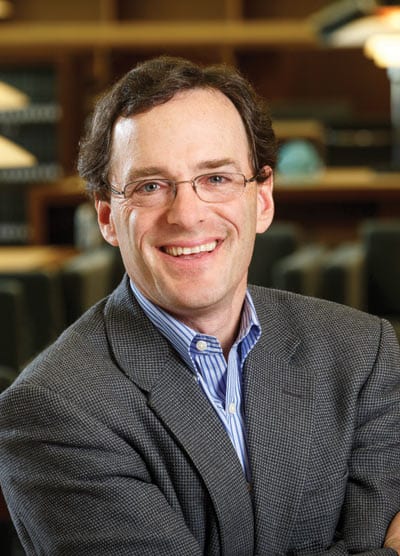
TED MERMIN ’96
ENCOURAGING CONSUMER COURAGE
After working as a judicial clerk and private-practice attorney, Ted Mermin ’96 applied for a dream job with the Civil Rights Section of the California Attorney General’s Office. The application form required him to list another section he’d be interested in. The Consumer Law Section looked intriguing (only question: What exactly was consumer law?). Twenty years later, Mermin is a beacon in the field and a role model for students.
Serendipity launched an “immensely gratifying” career—and a desire to build more lanes on the bridge he found without a roadmap. “I wanted to help give people interested in consumer law a smoother, more direct path than my own,” Mermin says.
Several years after gaining a professional foothold, he was asked to conduct a Berkeley Law training session for members of Thailand’s Supreme Court. Soon thereafter, the school hired him to teach its first JD course on consumer law. His classes blossomed from eight students to the maximum 30—with a growing waiting list—and Berkeley Law now offers three consumer law courses with more in the works.
Buoyed by his guidance, former students now work at the Federal Trade Commission, Consumer Financial Protection Bureau, and leading nonprofits in the field. Mermin also helped establish the Consumer Justice Clinic within the East Bay Community Law Center, which defends debt-collection lawsuits, educates consumers on deceptive and predatory lending programs, and litigates against operations that victimize non-English-speaking immigrants.
“We quickly realized the need for systematic reform,” Mermin says. “We worked for three years to pass the Fair Debt Buying Practices Act in California, and clinic students played a huge role in that success. This past year, students were integral again in the passage of two follow-up bills on debt collection and wage garnishment.”
Part of the school’s public interest mentoring program for a decade, he recently helped create a consumer law alumni mentor program with Allison Pincus ’17 and Joshua Epstein ’17. Mermin marvels at how consumer protection fever now permeates Berkeley Law, as evidenced by curricular and clinic expansion, conferences, and students forming the Consumer Advocacy Protection Society and the Consumer Rights Workshop.
“We want to cultivate courageous lawyers, and a good way to do that is by letting students and attorneys know that people care about their dreams and care about their well-being,” he says. “When you feel supported, it’s easier to feel emboldened.”


